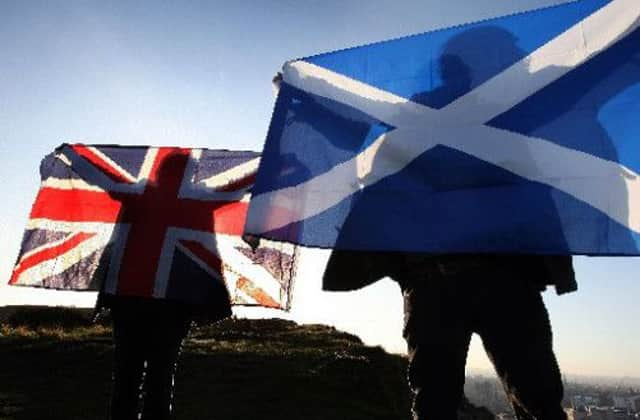Gerry Hassan: We’re on the road to somewhere


It is a point Alex Salmond reflected on this week, for his own obvious reasons, but true nonetheless.
A small, but significant, watershed moment took place this week with the conclusion of Road to Referendum, a three-part STV series on Scotland’s recent political history.
Advertisement
Hide AdAdvertisement
Hide AdThe programmes were well-made, persuasive and accessible with a good choice of archive footage and a range of voices, myself included, looking back over the arc of post-war Scotland.
The long backdrop to this is familiar – Wallace, Bruce, Wars of Independence and then union. There then followed a North British high noon: Empire comes then goes, the once-powerful Kirk slowly withers, and traditional industries provided huge wealth for the few before the painful decline.
And for many, 1945 is seen as the pivotal point of contemporary Britishness – the establishment of the welfare state, NHS and full employment. This is followed by the inexorable economic decline of the UK and the rightward march of its politics. Thatcher, Blair, Cameron become archetypical villains.
The above list has come close to being the dominant and official story of modern Scotland. It partly explains why we are where we are: why Labour were brought back to devolution in the 1970s, then became convincing advocates of a parliament in the 1990s; the transformation of the SNP; the twilight of Westminster and the Labour state; and the importance of arts, culture and creativity.
Now this version of our recent history is like any perspective – political and partial. It couldn’t fail to be. It also excludes large parts of Scottish experience. It doesn’t address the power of conservatism across society historically and to this day, and radical Scotland’s collusion with it. Then there is the stranglehold of entitlement Scotland – in the public sector, quangos and business life.
Along with this there is the dynamic of Britain and its appeal, which is constantly changing. Scots generally were attracted to the idea of progressive Britain at the mid-point of the 20th century – whether on offer from Labour or Tory politicians. And despite their doubts and disenchantments with Westminster, there is still a long-term, more than residual attachment to the idea and ideal of Britain.
Is the Scotland conveyed in Road to Referendum the only story in town? If so does it point, however many detours and back roads we travel on, towards one direction – independence? And what about that once-powerful unionist account of Scotland and Britain – which believed that the future was there for making and filled with optimism? Does it have any relevance, beyond grumpy old men trying to scare us with tales of separatist bogeymen and their own pessimism and dashed hopes?
Road to Referendum in the title and prognosis implies a linear path towards something: greater national awareness, more self-government, a less-active British state in Scottish affairs. This may all turn out to be our future or it might not, but surely by talking about and anchoring our debates in this perspective we increase the likelihood that this might be our future.
Advertisement
Hide AdAdvertisement
Hide AdWho writes history – along with memory and myth – matters, as it informs and shapes the present and future. Scotland’s story has in the past three to four decades become one shaped by a sense of difference, identity and the purpose and practice of autonomy.
Now there are pros and cons in this. Advantages in that we care more passionately about what makes us unique, but disadvantages, in that too often we seem content as a nation and polity to tell ourselves couthy stories. It is also true that sometimes the future does not arrive in a tidy, straight way and instead comes with discontinuity, spikes and rupture.
The prevailing myths of modern times will play a major role towards September 2014. But we have to ask do they help or hinder us as we try to adapt and rise to the challenge of being a small nation in a globally inter-independent world?
Scotland is a land scarred by inequality, as shown by this week’s Oxfam Scotland report which revealed that our richest citizens are 273 times more wealthy than our poorest, while London acts as a powerful vortex, distorting a massively dysfunctional and disorientated British economy and society, holding the prize of being the most unequal city in the developed world.
The Scotland of Road to Referendum may be nationalist with a small “n” but it is also conservative with a small “c”: an amalgamation of the myths and folklore of Labour Scotland, the Nationalist account, and the potent elite ideology of “civic Scotland”.
There are many Scottish stories, hidden, forgotten, marginalised, along with the stories of missing Scotland, whom all political traditions claim to speak for and represent. Those stories have to go beyond our current narrow menu of constitutionally fascinating, but for most people arid, debates alongside a culture of conservative institutions and mindsets of some who seem to think they have a “Divine Right to Rule” for eternity.
Road to Referendum is part of this official, narrow perspective which has to eventually face challenge and be superseded. The future of Scotland, how we embrace change, address poverty and inequality, work out the rights and responsibilities of public Scotland and businesses, and nurture culture beyond economic instrumentalism, isn’t going to be answered by our constitutional debate. Call me naïve or an idealist, but it would be good if our historic choice next year were a moment for opening up debate, challenging myths and using the constitutional question to decide what kind of Scotland we want to be.
As things currently stand, that is going to require a Scots kind of quiet revolution.